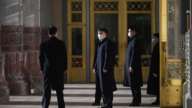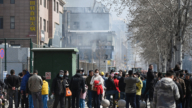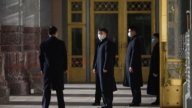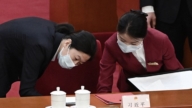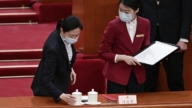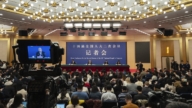【新唐人2013年03月11日訊】一直備受各界關注的大陸國務院「大部制改革」方案終於出爐。新一輪大部制改革由即將接任總理的李克強主導,政治局委員汪洋操刀。整合後,鐵道部、國家新聞出版總署等部委將被撤併,國務院正部級機構將減少4個。
10號上午,中共十二屆全國人大一次會議舉行第三次全體會議,大陸國務委員兼國務院秘書長馬凱,對「國務院機構改革和職能轉變方案」進行說明。
根據這一方案,國務院將不再保留鐵道部、衛生部、國家計生委、國務院食品安全委員會辦公室、廣電總局、國家新聞出版總署、國家電力監管委員會等7個正部級機構。而重新組建國家衛生和計劃生育委員會、國家食品藥品監督管理總局、和國家新聞出版廣播電影電視總局3個正部級機構。
據了解,這次的大部制改革由即將接任總理的李克強主持大局,而可能出任副總理的汪洋則負責具體實施。整合後,國務院將減少4個正部級機構,一些職能相同或相近的部門被撤併。
對此,時政評論家藍述向《新唐人》分析了大部制改革的背景。他指出,當前中共面臨的經濟形勢非常嚴峻,GDP增幅在下降,政府財政預算也遇到越來越大的危機。
時政評論家藍述:「所以說它要做一些必要的調整,減少一些政府部門養的不必要的機構和官員。這樣的話,(可以)減少社會矛盾。」
藍述也指出,中共所做的機構調整是「治標不治本」,並不能化解中國大陸的危機。
藍述:「中共也看到了所面對的危機,它也想做一些事情。但是問題的核心、問題的根本他們不去動。那就是——中共的問題。因為中國社會的一切核心問題就是中共。」
大陸鐵道部被稱為「獨立王國」,由中共前黨魁江澤民,及前中央政法委書記周永康等把持,貪腐嚴重,負債高達2點6萬億人民幣。前鐵道部部長劉志軍、副總工程師張曙光等人,先後因貪腐落馬。
這次調整,鐵道部的行政部門將改組為國家鐵路總局,併入大交通部,負責鐵路的建設規劃。鐵道部的運營部分則將變身為中國鐵路集團總公司,劃歸國資委,以企業模式運營。
原大陸史學教授 劉因全:「原來那樣呢,它的行政部門和企業合在一起,弊端很多。原來那個鐵道部長劉志軍貪污腐敗那麼嚴重,也與鐵道部的這個體制政企不分有關係的。」
鐵道部被分拆後留下的巨額負債如何處理﹖根據現任鐵道部長盛光祖的解釋,國家財政將負擔鐵道部的公益性債務,這也就是說,納稅人將為鐵道部的貪腐惡果買單。
此外,中國大陸越演越烈的毒奶粉、地溝油等食品安全事故,也迫使當局不得不把「國家食品藥品監管局」從衛生部門剝離出來,與國務院食品安全委員會辦公室合併,成立正部級的「國家食品藥品監督管理總局」。
多年來被廣為批評的「計生委」也將併入衛生部,組建「衛生與人口計劃生育部」。另外,國家電力監管委員會將被併入國家能源局,廣電總局與新聞出版總署,合二為一。
北京《國情內參》首席研究員鞏勝利:「其實中國大部制改革搞了10幾年了。但現在一直都沒有到位。比如這一次可能一些比較大的部,還沒有到位。可能接下去,還要來(整合)。」
北京《國情內參》期刊的首席研究員鞏勝利還指出,僅以農村城鎮化舉例分析,其中至少涉及進城農民的身份管理問題,和土地流轉問題。也就是說,這背後相關的農業部和國土資源部等部門的改革,還遠遠沒有到位。
採訪/劉惠 編輯/李謙 後製/蕭宇
China State Council Reorganizes. Ministry of Railways Dismantled
The Chinese State Council recently proposed institutional
reform and the transformation of government functions.
This will be conducted by the incoming Prime Minister,
Li Keqiang, and operated by Politburo member, Wang Yang.
According to the proposal, the Ministry of Railways will be
dismantled, with press and broadcasting regulators merged.
A total of four organizations under the State
Council will be either dismantled or merged.
In the morning of the 10 March, State Councilor Ma Kai
announced the Chinese State Council institutional reform
and transformation of government functions proposal,
to the annual session of the National People’s Congress.
Seven agencies will be affected.
These include; the Ministry of Railways; Health Ministry;
National Population and Family Planning Commission;
State Administration of Food and Drugs; the
General Administration of Press and Publications;
the State Administration of Radio, Film and
Television; and National Energy Administration.
The Council will establish a new National
Health and Family Planning Commission.
It will elevate the food and drug
agency to general administration.
It will set up one organ to oversee the press,
publications, radio, film and television sectors.
The incoming Prime Minister Li Keqiang
is expected to lead the State Council.
Deputy Prime Minister Wang Yang will operate
the restructuring and merging of departments.
Political commentator Lan Su spoke to NTD Television.
The proposal is in reaction to the difficult economy,
the declining GDP, and the budget crisis.
Lan Su: “These are adjustments to cut unnecessary
agencies and staff, and to reduce social conflicts.”
Lan Su, however, did not believe this
restructuring would relieve the crisis in China.
This is because it did not reach the core of the problem.
Lan Su: “The Communist regime saw the crisis,
but would not touch the core of the problem.
The Communist Party itself is the core issue for China.”
The Ministry of Railways is a so-called “independent
kingdom", dominated by former leader Jiang Zemin.
It is also dominated by the former secretary of the
Central Politics and Law Committee, Zhou Yongkang.
The corruption of the whole organization was
so severe that it carries a debt of 2.6 trillion yuan.
The former Minister of Railways Liu Zhijun,
and deputy chief engineer Zhang Shuguang, were respectively sacked due to corruption.
According to the proposal, the Ministry of Railways
will function under the Ministry of Transport.
This will allow it to fulfill its administrative functions
in technological standards and supervising.
The China Railway Corporation
will handle commercial functions.
Liu Yinquan, Historian: “The original Ministry of
Railways suffered the disadvantage of overseeing
both administration and commercial functions.
The corruption scandal of former Minister of Railways
Liu Zhijun is related to this doubling of responsibilities.”
How will the huge liabilities left behind
from the Ministry of Railways be handled?
According to the incumbent Minister of Railways
Sheng Guangzu, state finance will pay for
the welfare check from the Railway Ministry.
That means taxpayers pay for
the consequences of corruption.
The food safety issues in China are getting worse,
with the incidents of toxic infant formula and gutter oil.
They have pushed the ministry-level
General Administration of Food and Drugs.
They have merged the State Food and Drug
Administration under the Ministry of Health
and State Council’s Food Safety Office.
A national health and family planning
commission will be established.
They will merge the existing Health Ministry
with the widely criticized National Population
and Family Planning Commission.
State Electricity Regulatory Commission will be dissolved
and a new National Energy Administration will be set up.
Two press and broadcasting regulators will be merged.
Gong Shengli, Veteran Journalist: “Reorganization
of the regime has been done for the past 10 years.
It never quite gets to the point.
This time it was done on a larger scale, but still didn’t
get to the point. This type of reform will continue.”
Gong Shengli took rural urbanization as an example. There
are issues of the migrants identities and of land transfer.
That means reform of Ministry of Agriculture
and the Ministry of Land and Resources are necessary but this has not happened.


